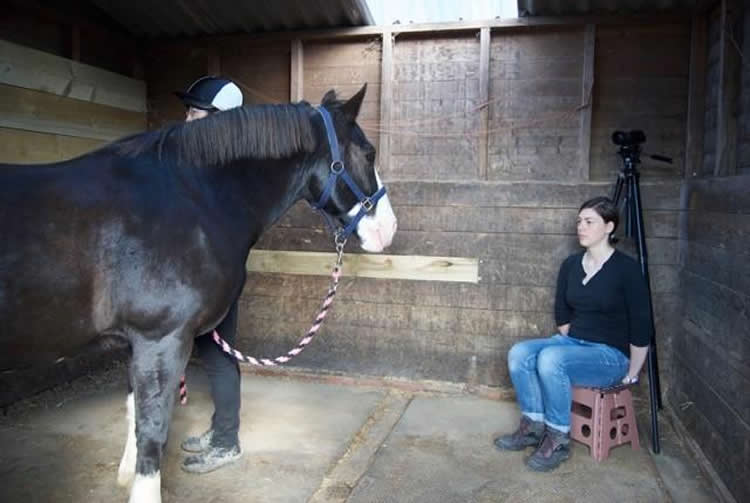Summary: Researchers reveal a horse can read and remember people’s emotional facial expressions.
Source: University of Sussex.
A study by the Universities of Sussex and Portsmouth reveals that horses can read and then remember people’s emotional expressions, enabling them to use this information to identify people who could pose a potential threat.
Published today, Thursday 26 April 2018, in the journal, Current Biology, the paper ‘Animals remember previous facial expressions that specific humans have exhibited’ is authored by a team of psychologists, co-led by Professor Karen McComb from the University of Sussex and Dr Leanne Proops, from the University of Portsmouth – both specialists in animal behaviour.
The research team conducted controlled experiments in which domestic horses were presented with a photograph of an angry or happy human face and several hours later saw the actual person who had exhibited the expression, now in an emotionally neutral state. This short-term exposure to the photograph of a person’s facial expression was enough to generate clear differences in subsequent responses upon meeting that individual in the flesh later the same day.
The study found that despite the humans being in a neutral state during the live meeting, the horses’ gaze direction revealed that they perceived the person more negatively if they had previously seen them looking angry in the photograph rather than happy. Previous research, including at University of Sussex, has shown that animals tend to view negative events with their left eye due to the right brain hemisphere’s specialisation for processing threatening stimuli (information from the left eye is processed in the right hemisphere).
Importantly, in the current experiment the humans did not know which photographs the horses had previously seen, to avoid any risk of behaving differently themselves. Also the differences in reaction only applied to the person the horses had actually seen in the photograph and were not given to a different person.

Professor Karen McComb from University of Sussex comments on the findings: “What we’ve found is that horses can not only read human facial expressions but they can also remember a person’s previous emotional state when they meet them later that day – and, crucially, that they adapt their behaviour accordingly. Essentially horses have a memory for emotion.”
Co-lead author Dr Leanne Proops, of the University of Portsmouth, said: “We know that horses are socially intelligent animals, but this is the first time any mammal has been shown to have this particular ability. What’s very striking is that this happened after just briefly viewing a photograph of the person with a particular emotional expression – they did not have a strongly positive or negative experience with the person.”
Although past research (including that conducted by the University of Sussex) has demonstrated that horses can recognise human facial expressions, this is the first time that it has been shown that they can remember emotional experiences with specific individuals. This ability could have clear benefits for social bonding and aggression avoidance when these individuals are encountered again.
Source: Anna Ford – University of Sussex
Publisher: Organized by NeuroscienceNews.com.
Image Source: NeuroscienceNews.com image is credited to Universities of Sussex and Portsmouth.
Original Research: Open access research for “Animals Remember Previous Facial Expressions that Specific Humans Have Exhibited” by Leanne Proops, Kate Grounds, Amy Victoria Smith, Karen McComb in Current Biology. Published April 26 2018.
doi:10.1016/j.cub.2018.03.035
[cbtabs][cbtab title=”MLA”]University of Sussex “Horses Remember Facial Expressions of People They Have Seen Before.” NeuroscienceNews. NeuroscienceNews, 26 April 2018.
<https://neurosciencenews.com/horse-face-memory-8892/>.[/cbtab][cbtab title=”APA”]University of Sussex (2018, April 26). Horses Remember Facial Expressions of People They Have Seen Before. NeuroscienceNews. Retrieved April 26, 2018 from https://neurosciencenews.com/horse-face-memory-8892/[/cbtab][cbtab title=”Chicago”]University of Sussex “Horses Remember Facial Expressions of People They Have Seen Before.” https://neurosciencenews.com/horse-face-memory-8892/ (accessed April 26, 2018).[/cbtab][/cbtabs]
Abstract
Animals Remember Previous Facial Expressions that Specific Humans Have Exhibited
Highlights
•Horses can remember emotional expressions that they’ve seen on human faces
•Responses differ if horses have seen an angry versus happy photo of the person
•This lasting memory for emotion is specific to the person whose face they saw
•Non-human animals monitor human emotions and adjust subsequent behavior accordingly
Summary
For humans, facial expressions are important social signals, and how we perceive specific individuals may be influenced by subtle emotional cues that they have given us in past encounters. A wide range of animal species are also capable of discriminating the emotions of others through facial expressions and it is clear that remembering emotional experiences with specific individuals could have clear benefits for social bonding and aggression avoidance when these individuals are encountered again. Although there is evidence that non-human animals are capable of remembering the identity of individuals who have directly harmed them it is not known whether animals can form lasting memories of specific individuals simply by observing subtle emotional expressions that they exhibit on their faces. Here we conducted controlled experiments in which domestic horses were presented with a photograph of an angry or happy human face and several hours later saw the person who had given the expression in a neutral state. Short-term exposure to the facial expression was enough to generate clear differences in subsequent responses to that individual (but not to a different mismatched person), consistent with the past angry expression having been perceived negatively and the happy expression positively. Both humans were blind to the photograph that the horses had seen. Our results provide clear evidence that some non-human animals can effectively eavesdrop on the emotional state cues that humans reveal on a moment-to-moment basis, using their memory of these to guide future interactions with particular individuals.







